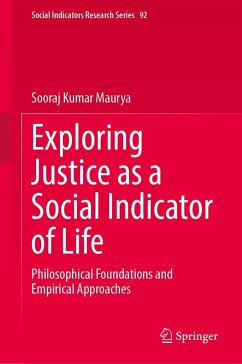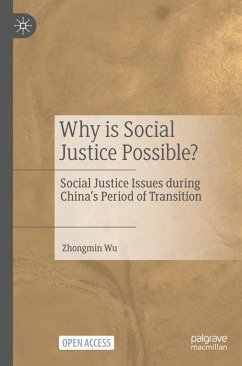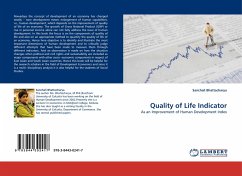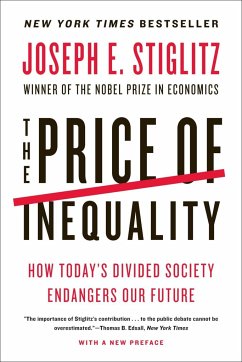
Exploring Justice as a Social Indicator of Life
Philosophical Foundations and Empirical Approaches
Versandkostenfrei!
Versandfertig in 6-10 Tagen
91,99 €
inkl. MwSt.

PAYBACK Punkte
46 °P sammeln!
This book explores justice as both a philosophical concept and a measurable social indicator for evaluating quality of life. It offers an original framework that integrates ethical theory with empirical applications in public policy, especially in sectors such as health, education, and the environment.Rooted in the rich traditions of moral and political philosophy, the book redefines justice as a central dimension of human well-being one that can be both conceptually coherent and practically assessed. Through a critical engagement with classical thinkers, contemporary theories, and applied cas...
This book explores justice as both a philosophical concept and a measurable social indicator for evaluating quality of life. It offers an original framework that integrates ethical theory with empirical applications in public policy, especially in sectors such as health, education, and the environment.
Rooted in the rich traditions of moral and political philosophy, the book redefines justice as a central dimension of human well-being one that can be both conceptually coherent and practically assessed. Through a critical engagement with classical thinkers, contemporary theories, and applied case studies, the book presents a justice-centered alternative to existing models based on utility, capabilities, or economic welfare. Each chapter bridges abstract principles with real-world implications, offering insights into how justice can be integrated into policy design, performance evaluation, and development agendas. The author challenges the prevailing fragmentation between normative theory and social indicators, proposing a unifying approach that enriches both. This book is essential reading for scholars in philosophy, sociology, development studies, and public policy, as well as for practitioners interested in embedding ethical considerations into social measurement and decision-making. By foregrounding justice as both an end and a means, this book opens new pathways toward a more equitable and reflective approach to quality of life.
Rooted in the rich traditions of moral and political philosophy, the book redefines justice as a central dimension of human well-being one that can be both conceptually coherent and practically assessed. Through a critical engagement with classical thinkers, contemporary theories, and applied case studies, the book presents a justice-centered alternative to existing models based on utility, capabilities, or economic welfare. Each chapter bridges abstract principles with real-world implications, offering insights into how justice can be integrated into policy design, performance evaluation, and development agendas. The author challenges the prevailing fragmentation between normative theory and social indicators, proposing a unifying approach that enriches both. This book is essential reading for scholars in philosophy, sociology, development studies, and public policy, as well as for practitioners interested in embedding ethical considerations into social measurement and decision-making. By foregrounding justice as both an end and a means, this book opens new pathways toward a more equitable and reflective approach to quality of life.












